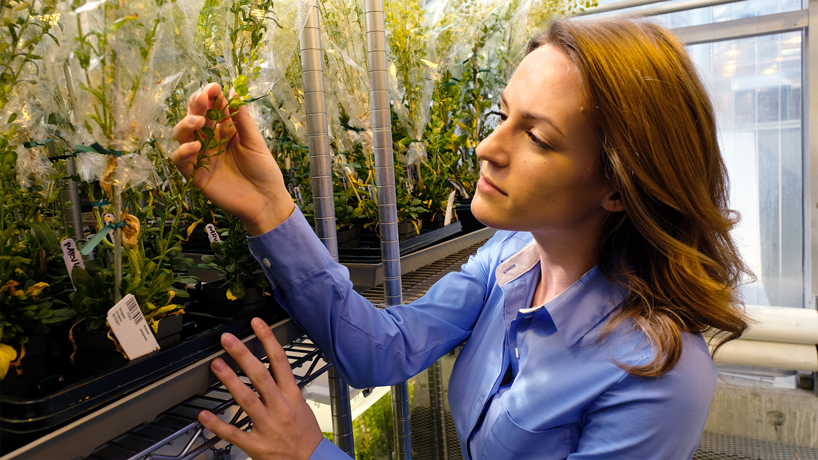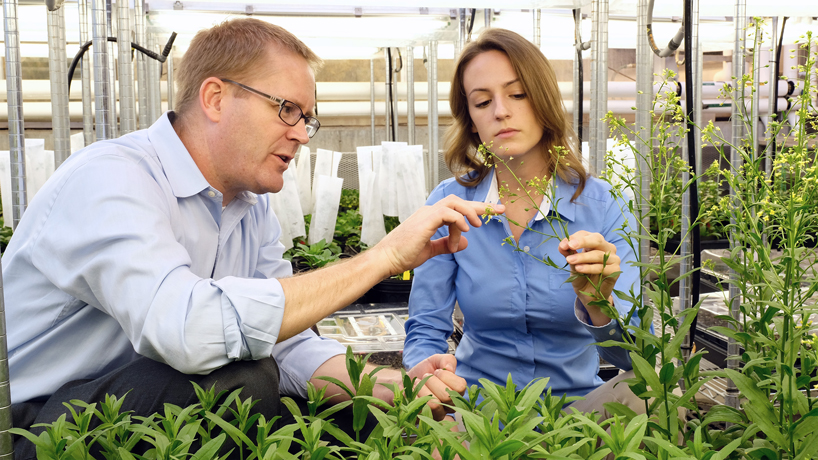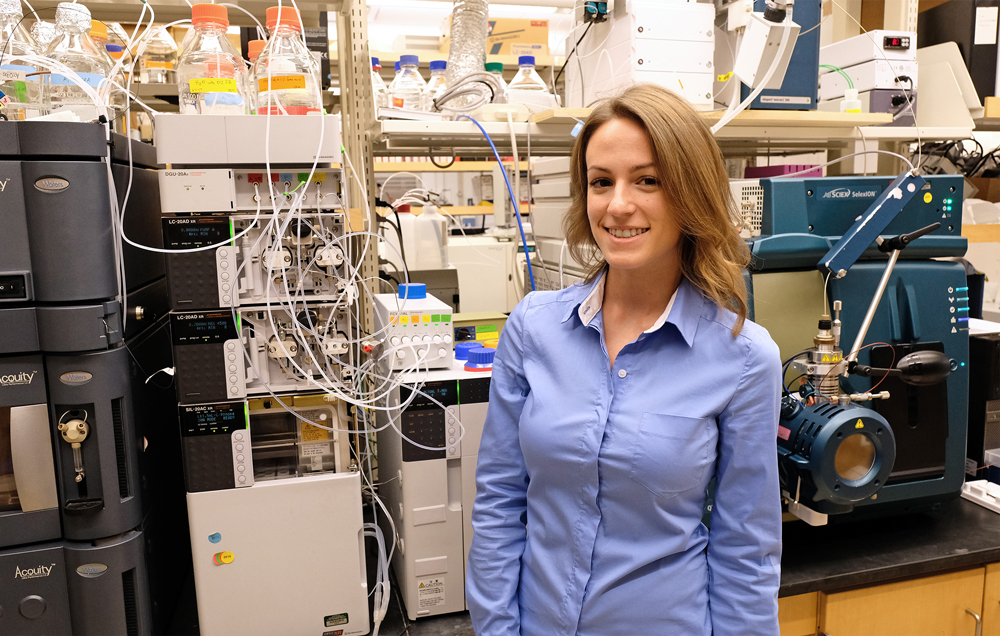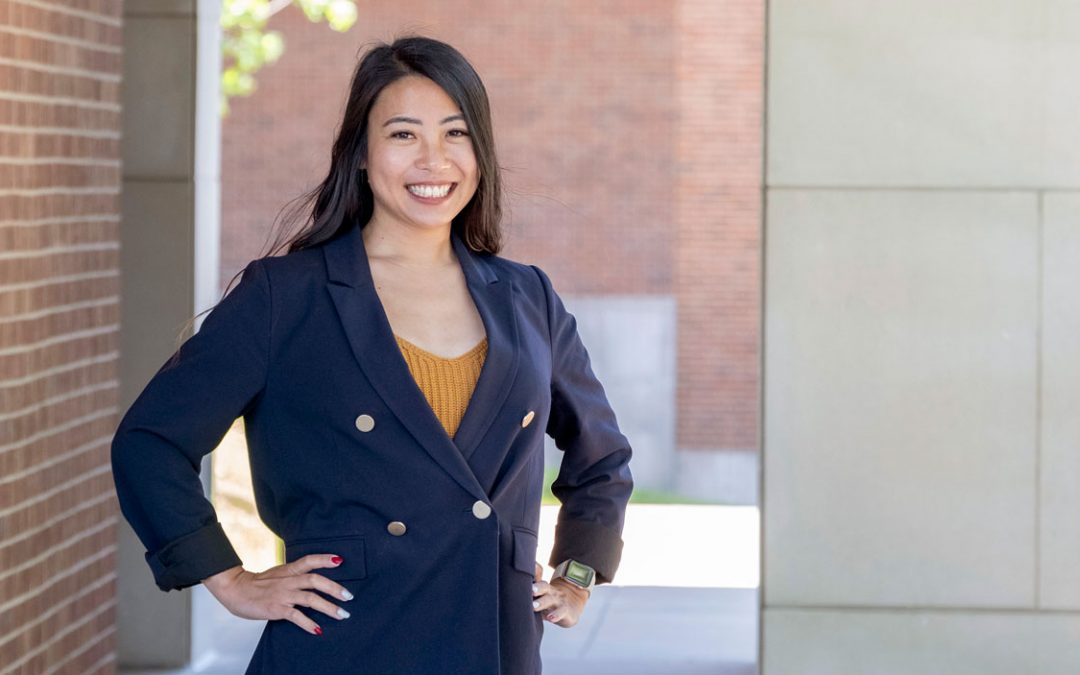
Senior biochemistry and biotechnology major Lauren Jenkins checks the seed pods of a Camelina sativa oilseed plant. Her REU internship research at the Donald Danforth Plant Science Center has her quantifying the levels of acyl carrier proteins, which are crucial in the plant’s production of lipids that can be used for biofuels. (Photographs by August Jennewein)
Many people watch the seeds they’ve planted mature into flowers and other garden greenery over the sun-filled summer months. Lauren Jenkins, on the other hand, has spent the summer analyzing seeds from crops that can be used for biofuels.
It’s research Jenkins does as an intern in the Donald Danforth Plant Science Center’s Research Experience for Undergraduates Summer Internship Program.
Part of the nationwide REU program funded by the National Science Foundation, the Danforth Center is one of a select number of sites across the country hosting REU internships that are highly competitive.
Jenkins, an Opportunity Scholar and Pierre Laclede Honors College student at the University of Missouri–St. Louis, was one of 20 students selected from 237 total nationwide who applied to intern at the Danforth Center.
The senior biochemistry and biotechnology major is working to quantify levels of acyl carrier proteins in oilseeds, including Camelina sativa (commonly known as “false flax”), soybean and canola.

USDA Research Scientist and Danforth Center Associate Member Doug Allen (at left) teaches Lauren Jenkins about the seed pods of the Camelina sativa. Allen has guided and taught Jenkins during the 11-week, full-time REU internship she’s had in his lab, which investigates plant metabolism.
The project, based out of the laboratory of USDA Research Scientist and Danforth Center Associate Member Doug Allen, is a “challenging one,” according to Allen, who investigates plant metabolism.
“Lauren’s project is complex,” he said. “Quantifying levels of this group of proteins poses a lot of difficulties because they are present at very low levels in biological systems.”
The acyl carrier protein Jenkins studies orchestrates the production of fatty acids, which are core components of lipids. Oilseed lipids can serve as biofuel for jets and large trucks and are also an important source of energy in human and animal diets. With those practical applications in mind, scientists like Allen are working to understand lipid production in plants that can benefit people and animals.
“If we want to enhance the production of lipids and understand why it is that some plant species do a better job of making lipids compared to other plant species, then we need to understand their metabolism,” Allen said.
“Metabolic processes get down to the nuts and bolts of how things work in a cell,” Jenkins said. “Studying and understanding metabolism in a cell is kind of like taking apart a machine to figure out how it works, except this is biochemical. Once you understand it, you can start improving certain parts to get better production of something.”
Although she has chosen a complex field of study, Jenkins has caught on to the science and picked up the lab techniques quickly, said Allen.
“She’s able to listen carefully, take good notes, follow protocols and make informed decisions” he said. “Lauren quickly grasped concepts associated with running a mass spectrometer. Given the sophistication of this instrument, this was no small accomplishment. Now she conducts her own experiments, with some guidance, to explore scientific hypotheses about lipid production in plants.”

Lauren Jenkins, an Opportunity Scholar at UMSL and REU intern at the Danforth Center, poses in front of the mass spectrometer (the blue machine), which allows her to determine the composition of molecules and, although difficult because of their low levels in biological systems, quantify levels of acyl carrier proteins.
To prepare the protein for testing, Jenkins harvests the seeds and places them in liquid nitrogen to essentially quench all metabolic processes that are occurring. She then extracts the protein from seed biomass. Using the mass spectrometer, which deciphers a molecule’s composition, she quantifies the levels of these proteins.
Over the next several weeks she’ll have results for protein levels in canola and soybean plants, which will provide insight into the fatty acid metabolism and ultimately the lipid production in the oilseed.
Although the 11-week, full-time REU internship is coming to a close, Allen has invited Jenkins to continue working part time in the USDA lab at the Danforth Center this fall.
“I wanted her to continue working here because she has been very productive and is making good progress on her project and scientific questions,” Allen said. “In addition, I think the laboratory setting will provide exposure to many research questions and techniques as she helps others and develops skills that will be valuable to her in the future.”
While learning particular lab techniques has expanded Jenkins’ skill set, she said it wasn’t necessarily those lessons that have had the most impact on her.
“Thinking things through and understanding what I’m doing before every experiment – that’s something that Doug really emphasized and is the most important thing I’m taking away from this experience.”
Jenkins intends to go on to graduate school after she graduates with her bachelor’s degree from UMSL in the spring of 2018. While she’s unsure exactly what she will specialize in, applying biochemistry to plant science is certainly a contender now.















